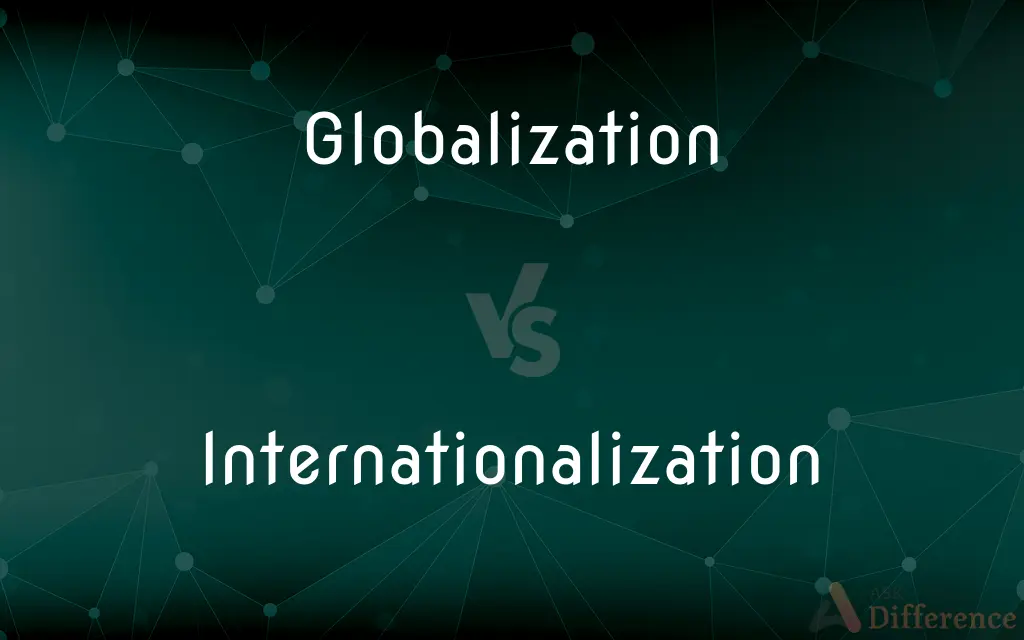Globalization vs. Internationalization — What's the Difference?
Edited by Tayyaba Rehman — By Urooj Arif — Updated on April 23, 2024
Globalization involves integrating economies, cultures, and governance worldwide, while internationalization refers to adapting products and services for international markets.

Difference Between Globalization and Internationalization
Table of Contents
ADVERTISEMENT
Key Differences
Globalization is the process of interaction and integration among people, companies, and governments worldwide, driven by international trade and investment and aided by information technology. On the other hand, internationalization focuses specifically on modifying products or services to suit different languages and cultural contexts to expand into global markets.
The concept of globalization encompasses the global movement of goods, capital, and labor, facilitating a more interconnected and interdependent world economy. Whereas internationalization primarily deals with business strategies aimed at entering foreign markets, often without significant changes to the core business model.
In globalization, cultural exchange is a key element, with the global spread of ideas, information, and cultural symbols. Conversely, internationalization may involve localizing content and marketing strategies to align with local cultural norms and values, ensuring relevance in diverse markets.
Economically, globalization can lead to increased economic growth but also to greater economic disparities, as it integrates developing countries into the world economy. In contrast, internationalization is viewed as a business growth strategy that may increase a company's competitiveness but doesn't inherently address broader economic inequalities.
Politically, globalization can influence governance through international agreements and regulations that transcend national borders. Internationalization, however, often involves navigating those regulations, focusing on compliance and strategic alignment with multiple national standards and laws.
ADVERTISEMENT
Comparison Chart
Definition
Integration of markets, cultures, and governments
Adapting products for international markets
Focus
Global interconnectedness
Market-specific strategies
Key Elements
Trade, investment, culture exchange
Localization, compliance
Economic Impact
Can create disparities
Focuses on company growth
Cultural Impact
Spreads cultural symbols globally
Adapts to local cultures
Compare with Definitions
Globalization
The process of integrating nations through trade, communication, and transportation.
Globalization has made it possible for consumers to buy products from around the world.
Internationalization
The adaptation of products for foreign markets.
Internationalization often involves translating software into multiple languages.
Globalization
A phenomenon that increases global interactions.
Globalization has led to more multicultural cities.
Internationalization
Tailoring marketing to different cultural norms.
Internationalization involves customizing advertising campaigns for different regions.
Globalization
The spread of technology and information across borders.
The internet has been a major tool for globalization.
Internationalization
Ensuring compliance with international standards.
Internationalization frequently addresses regulatory requirements across countries.
Globalization
The integration of global economies.
Globalization has impacted job markets worldwide.
Internationalization
A strategy to make businesses globally competitive.
Internationalization has led to diverse product offerings worldwide.
Globalization
Influence on global governance and cultural exchange.
Globalization has fostered international agreements on climate change.
Internationalization
The process of planning and implementing products globally.
Internationalization requires understanding local market demands.
Globalization
Globalization, or globalisation (Commonwealth English; see spelling differences), is the process of interaction and integration among people, companies, and governments worldwide. Globalization has accelerated since the 18th century due to advances in transportation and communication technology.
Internationalization
In economics, internationalization or internationalisation is the process of increasing involvement of enterprises in international markets, although there is no agreed definition of internationalization. Internationalization is a crucial strategy not only for companies that seek horizontal integration globally but also for countries that addresses the sustainability of its development in different manufacturing as well as service sectors especially in higher education which is a very important context that needs internationalization to bridge the gap between different cultures and countries.
Globalization
To make global or worldwide in scope or application.
Internationalization
To make international.
Globalization
Alternative spelling of globalisation
Internationalization
To put under international control.
Globalization
Growth to a global or worldwide scale;
The globalization of the communication industry
Internationalization
The conversion of something in order to make it international.
Internationalization
(software engineering) The act or process of making a product suitable for international markets, typically by making text messages easily translatable and ensuring support of non-Latin character sets, languages, and regions.
Internationalization
The act of bringing something under international control.
Internationalization
The act of bringing something under international control
Common Curiosities
How is internationalization important for businesses?
Internationalization helps companies expand their market reach and adapt to local consumer preferences.
What are the cultural implications of globalization?
Globalization promotes the exchange of cultural values and practices, which can lead to both cultural homogenization and diversity.
What is internationalization?
Internationalization refers to the adaptation of products and services to fit international markets.
What is globalization?
Globalization is the process of integrating economies, cultures, and governance around the world.
How does globalization affect economies?
Globalization can stimulate economic growth but may also contribute to economic and social inequalities.
What role does technology play in globalization?
Technology facilitates faster communication, information exchange, and economic transactions, thus accelerating globalization.
What are the political consequences of globalization?
Globalization can lead to the creation of supranational institutions and agreements, affecting national sovereignty.
Can internationalization impact local cultures?
Yes, while adapting products, internationalization can influence local cultures by introducing new practices and technologies.
What are some strategies for internationalization?
Strategies include localizing content, understanding local consumer behavior, and adhering to local regulations.
How does globalization influence global trade?
It increases the volume and variety of cross-border transactions in goods and services and enhances economic interdependence.
How does a company benefit from internationalization?
Internationalization can lead to increased sales, brand awareness, and business growth in global markets.
Share Your Discovery

Previous Comparison
Clan vs. Tribe
Next Comparison
Myopia vs. HypermetropiaAuthor Spotlight
Written by
Urooj ArifUrooj is a skilled content writer at Ask Difference, known for her exceptional ability to simplify complex topics into engaging and informative content. With a passion for research and a flair for clear, concise writing, she consistently delivers articles that resonate with our diverse audience.
Edited by
Tayyaba RehmanTayyaba Rehman is a distinguished writer, currently serving as a primary contributor to askdifference.com. As a researcher in semantics and etymology, Tayyaba's passion for the complexity of languages and their distinctions has found a perfect home on the platform. Tayyaba delves into the intricacies of language, distinguishing between commonly confused words and phrases, thereby providing clarity for readers worldwide.














































